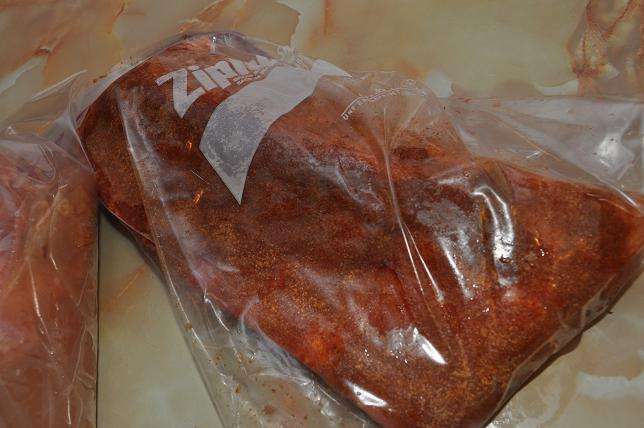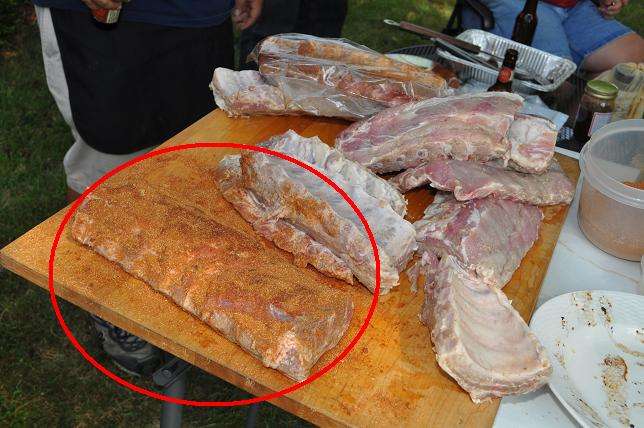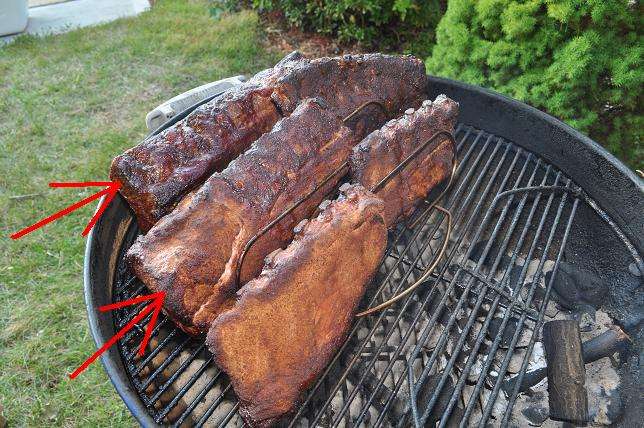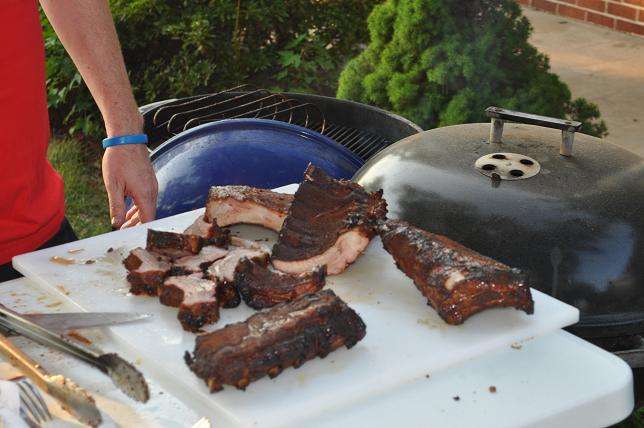GrillinFool
Full Fledged Farker
This is a blog post that I put up today, but thought I would bring it here, in its entirety to get some discussion going.
Brining is becoming more and more popular, particularly with poultry. There is little debate as to whether or not to brine a chicken or a turkey. Most people agree that it improves the flavor of the bird. But what about other meats? Pork or even beef? I recently did side by side, blind taste tests on both but will focus on the pork here, and in this case ribs

First a little about brining. What is a brine? In the simplest term it’s salt water. But doesn’t salt dry things out? Normally it does, but in this case it does the exact opposite. See, the salt forces water out of the salt water solution and in a situation when that solution surrounds a piece of meat, the only place for the liquid to go is into the meat. So it makes meat juicier. Salt water also breaks down connective tissue and thus makes meat more tender. If you stopped there you would be ahead of most people. But there’s one more step to take to another level. What if that fluid moving from the salt solution into the meat wasn’t water but something like root beer, pumpkin ale, or apple cider? Then it also adds flavor.
To summarize, brining moisturizes, tenderizes and flavorizes the meat. It’s hard to argue with this as these are facts, but still it’s something that is hotly debated. Many argue that there is no need to brine as the rub is all one needs to add flavor to meat. I agree that rub adds a lot of flavor. But that doesn’t preclude a brine from adding flavor. Adding granulated garlic to ribs adds a lot of flavor, doesn’t mean I shouldn’t also add brown sugar or paprika or pepper or all three to add even more.
If you still don’t believe me, then keep reading about the somewhat scientific experiment I did where I had 7 guys each taste two ribs, cooked identically except for one detail, one was brined. I didn’t tell them until after they sampled which rib was brined.
First the brine
Ingredients:
1 quart apple cider
2 tbsp minced garlic
1/4 cup table salt
10 turns black pepper
10 turns white pepper
The basic idea here is 1 gallon of fluid per cup of salt. This is plenty for 2-3 slabs of ribs. If you plan on doing more or less than that, just remember to keep the ratio of 1 gallon of water to 1 cup of salt. Get creative with the fluid. I’ve used pomegranate, apple juice, sprite, root beer, and plain old water.
You can use whatever rub you want for this experiment as long as the rubs are identical. In this case I used my pumpkin rub.
Ingredients:
1 tbsp pumpkin pie spice
1 tbsp granulated garlic
1 tbsp brown sugar
1/2 tbsp paprika
5 turns black pepper
5 turns white pepper
This is enough for a slab of ribs, if you want to make more, keep the ratio the same: 1 part each of pumpkin pie spice, granulated garlic and brown sugar to a half part paprika. No salt is listed in this rub as I will get to that later.
I had 7 guys coming over for this massive home tailgating session I did for the opening of the NFL season so I cut off the last few bones off a slab to make it only 8 ribs (one for each of my guests and one for me). You can see the small remainder of the slab on the left and me pointing to the 8 bone slab on the right:

I did the same thing with another similar slab of ribs for the brined slab.
For the 8 bone slab above, I applied the rub liberally the night before to both sides, always bone side first so the rub doesn’t stick to the cutting board when I flip them over to rub the other side:


The natural concave of the ribs allows the rub to be elevated over the cutting board and not stick to it.
I placed the ribs in a ziplock bag.
I combined the brine ingredients and put the 8 bone slab and a couple other half slabs into the brine:

Here’s a closeup of the rubbed ribs in the bag:

The next day, I removed the brined ribs from the bag and rinsed the brine off and patted them dry with a paper towel and applied the rub:

I added no salt to the ribs above as the brine handled that for me. For the ribs I rubbed the night before, I gave them a liberal coating of coarse salt before going on the grill manufacturer that shall not be named:

I went with the high heat method which is indirect grilling of the baby back ribs at 275-300 for two hours with pear wood.
Here are the ribs on the grill, the arrows indicating which two are part of the experiment:

After two hours I pulled the ribs, let them rest for about five minutes and sliced:


And then these guys tried one of each:

From left to right that’s Brian, Arthur, David and Shane. The other three were Scott, Erik, and Roy (not pictured) as well as myself. Of the blind taste testers, the brined rib got all 7 votes as well as one from me, but I knew which was which.
How is the brined rib different? It has a certain sweetness that is not in the unbrined rib. It’s got a couple more levels of flavor and is juicier. If you still have doubts, all you have to do is try this experiment yourself. You don’t need to have a bunch of people do it blind. All you need is taste them yourself and you will never go back to rub only. This is the third time I’ve done this blind experiment on others and have yet to have a single person prefer the unbrined rib.
Brining is becoming more and more popular, particularly with poultry. There is little debate as to whether or not to brine a chicken or a turkey. Most people agree that it improves the flavor of the bird. But what about other meats? Pork or even beef? I recently did side by side, blind taste tests on both but will focus on the pork here, and in this case ribs

First a little about brining. What is a brine? In the simplest term it’s salt water. But doesn’t salt dry things out? Normally it does, but in this case it does the exact opposite. See, the salt forces water out of the salt water solution and in a situation when that solution surrounds a piece of meat, the only place for the liquid to go is into the meat. So it makes meat juicier. Salt water also breaks down connective tissue and thus makes meat more tender. If you stopped there you would be ahead of most people. But there’s one more step to take to another level. What if that fluid moving from the salt solution into the meat wasn’t water but something like root beer, pumpkin ale, or apple cider? Then it also adds flavor.
To summarize, brining moisturizes, tenderizes and flavorizes the meat. It’s hard to argue with this as these are facts, but still it’s something that is hotly debated. Many argue that there is no need to brine as the rub is all one needs to add flavor to meat. I agree that rub adds a lot of flavor. But that doesn’t preclude a brine from adding flavor. Adding granulated garlic to ribs adds a lot of flavor, doesn’t mean I shouldn’t also add brown sugar or paprika or pepper or all three to add even more.
If you still don’t believe me, then keep reading about the somewhat scientific experiment I did where I had 7 guys each taste two ribs, cooked identically except for one detail, one was brined. I didn’t tell them until after they sampled which rib was brined.
First the brine
Ingredients:
1 quart apple cider
2 tbsp minced garlic
1/4 cup table salt
10 turns black pepper
10 turns white pepper
The basic idea here is 1 gallon of fluid per cup of salt. This is plenty for 2-3 slabs of ribs. If you plan on doing more or less than that, just remember to keep the ratio of 1 gallon of water to 1 cup of salt. Get creative with the fluid. I’ve used pomegranate, apple juice, sprite, root beer, and plain old water.
You can use whatever rub you want for this experiment as long as the rubs are identical. In this case I used my pumpkin rub.
Ingredients:
1 tbsp pumpkin pie spice
1 tbsp granulated garlic
1 tbsp brown sugar
1/2 tbsp paprika
5 turns black pepper
5 turns white pepper
This is enough for a slab of ribs, if you want to make more, keep the ratio the same: 1 part each of pumpkin pie spice, granulated garlic and brown sugar to a half part paprika. No salt is listed in this rub as I will get to that later.
I had 7 guys coming over for this massive home tailgating session I did for the opening of the NFL season so I cut off the last few bones off a slab to make it only 8 ribs (one for each of my guests and one for me). You can see the small remainder of the slab on the left and me pointing to the 8 bone slab on the right:

I did the same thing with another similar slab of ribs for the brined slab.
For the 8 bone slab above, I applied the rub liberally the night before to both sides, always bone side first so the rub doesn’t stick to the cutting board when I flip them over to rub the other side:


The natural concave of the ribs allows the rub to be elevated over the cutting board and not stick to it.
I placed the ribs in a ziplock bag.
I combined the brine ingredients and put the 8 bone slab and a couple other half slabs into the brine:

Here’s a closeup of the rubbed ribs in the bag:

The next day, I removed the brined ribs from the bag and rinsed the brine off and patted them dry with a paper towel and applied the rub:

I added no salt to the ribs above as the brine handled that for me. For the ribs I rubbed the night before, I gave them a liberal coating of coarse salt before going on the grill manufacturer that shall not be named:

I went with the high heat method which is indirect grilling of the baby back ribs at 275-300 for two hours with pear wood.
Here are the ribs on the grill, the arrows indicating which two are part of the experiment:

After two hours I pulled the ribs, let them rest for about five minutes and sliced:


And then these guys tried one of each:

From left to right that’s Brian, Arthur, David and Shane. The other three were Scott, Erik, and Roy (not pictured) as well as myself. Of the blind taste testers, the brined rib got all 7 votes as well as one from me, but I knew which was which.
How is the brined rib different? It has a certain sweetness that is not in the unbrined rib. It’s got a couple more levels of flavor and is juicier. If you still have doubts, all you have to do is try this experiment yourself. You don’t need to have a bunch of people do it blind. All you need is taste them yourself and you will never go back to rub only. This is the third time I’ve done this blind experiment on others and have yet to have a single person prefer the unbrined rib.
